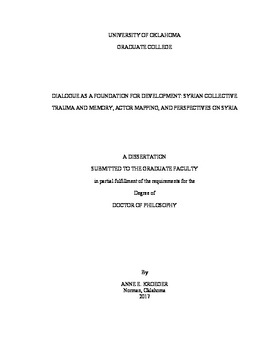| dc.description.abstract | In 1949, President Harry S. Truman called upon the global North to aid the “underdeveloped” global South. With Truman’s “Point Four” declaration, the United States sought to combat the rising threat of communism with democracy and free markets. However, the concept of modernization through Westernization is deeply rooted in colonial-imperial relations, and “development” has been the mechanism for transmission in the post-colonial world. Further, development discourse acts to create and control “underdeveloped” countries as incapable and “backwards.” Anthropologists have been at the forefront of criticizing “development,” and in particular the development discourse as it constructs “underdeveloped” countries. The development discourse is powerful, and has shaped development actions and methods, such as the pervasive “expert” model. The “expert” model and the technocratic elite frame poverty – and potential solutions – as technical that can be assuaged by “advanced” Western “experts.” The “expert” model serves to reinforce “developed” countries as capable, while simultaneously constructing “underdeveloped” countries as the opposite. Worse still, those “underdeveloped” countries are not reaping benefits of “being developed,” and in many cases, “being developed” has created more poverty, conflict, and strife. Yet, human development is essential, and it not without its successes, particularly in access to medical care and the global decrease of infectious diseases. However, “developed” countries became wealthy and “advanced” by exploiting countries now described as “underdeveloped.” The wealth accumulated by “developed” countries serves to insulate them and results in differential disease patterns. One of the main points of this research is to provide an alternative model for development dialogue, which will hopefully lead to better development projects. This research applied an old method – the Delphi method – to a new field, in order to generate better development dialogue with a more diverse set of actors. With the inclusion of more diverse voices, the Delphi method levels the power imbalances at play by keeping the facilitated dialogue anonymous and weighing all participant equally. In addition, the generated dialogue provides insight into three components currently missing in development by examining Syrian collective trauma and memory, peer-assessment political actor mapping, and the political, economic, social, and cultural state of Syria. With many societies experiencing dislocations, dialogue centered on collective trauma and memory is an essential component to understanding group identity and narratives. Collective (cultural) traumas are traumatic events that are experienced and internalized by a group. Social life is interrupted, and in some way, social bonds and norms are damaged to make social life more unpredictable and chaotic. Collective traumas can act as cohesive agents for the in-group, while disrupt bonds and trust with the constructed out-group. Memories of cultural traumas are internalized collective narratives, and are often critical components of understanding group identity. The generated dialogue on Syrian collective trauma and memory provide insight into Syrian identity and constructed narratives of Syria acting as a hero, victim, bystander, and perpetrator – necessary context when planning and implementing national development initiatives, particularly in a country currently experiencing a chronic trauma. Additionally, peer-assessment of local, regional, and international actors contextualizes political relations, power dynamics, and intentions of each actor. An understanding of the political context better precludes development agencies from imperceptibly acting politically, while also enabling less powerful actors to find common ground. Lastly, the political, economic, social, and cultural dimensions in this research provide a glimpse into the current situation and priorities of the actors, which must be used to avoid the critical (and common) development mistake of Western “experts” deciding for the rest. These dimensions provide a starting point in the conversation about priorities, which should inform any development initiative. Layered together, these components provide the foundation for more comprehensive and productive dialogue. Ultimately, the goal is to change the conversation in development and provide a foundation for better development and post-conflict reconstruction for Syria by Syrians. | en_US |
